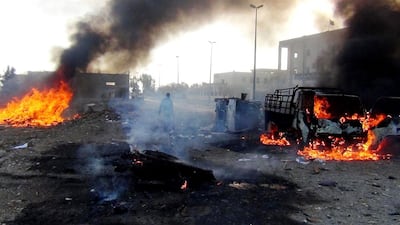BEIRUT // The deadliest airstrikes ever made by the Syrian regime on the ISIL stronghold of Raqqa killed almost 100 people, 52 of whom were civilians, the Syrian Observatory for Human Rights said on Wednesday.
Government jets targeted at least nine sites on Tuesday, including a popular market near Raqqa’s museum.
Two strikes were made in quick succession on the industrial area near the railway station. Ninety five people were reported to have been killed but the Observatory could not confirm whether the 43 dead not listed as civilians were ISIL militants.
Raqqa was seized by ISIL fighters last year. It was the first provincial capital to fall from regime control and has been used as the capital of ISIL’s self-proclaimed “caliphate” straddling Syria and neighbouring Iraq.
The number of people who have died in the multi-sided Syrian conflict has risen to more than 195,000. Millions have been forced from their homes since the uprising against the regime of Syria’s president, Bashar Al Assad began three and a half years ago.
The government has in recent months stepped up its airstrikes against ISIL-held towns in the north and east, with most of the casualties reported to have been civilians.
Raqqa has also been the target of repeated airstrikes by the US-led coalition fighting the militants.
The exiled opposition Syrian National Coalition condemned the strikes as a “brutal massacre”, warning that “many seem now convinced that Mr Al Assad is the major beneficiary of the US-led coalition strikes” against the militants.
Amateur video footage distributed by activists in Raqqa showed several bloodied bodies laid out on a street near an apparent bombing site, as an ambulance rushed to the scene.
Aid workers in red overalls bearing the Red Crescent symbol could be seen placing the corpses into white body bags.
Strategically located on the river Euphrates, Raqqa had a pre-war population of about 220,000 but it is now home to 300,000-350,000 people, including many displaced by the conflict, according to the Observatory, which monitors the war through a network of sources.
Since the Islamists first started moving into the city, they have been gradually imposing a brutal yet highly organised system with all the trappings of a state, experts say.
In Iraq, the other main focus of the US-led military campaign against ISIL, pro-government forces have managed to recapture some of the territory lost in a sweeping June offensive by the jihadists.
However, the militants sill hold large areas of the country, including the key cities of Mosul, Tikrit and Fallujah.
A Syrian regime delegation headed by foreign minister Walid Al Moualem met Russian president Vladimir Putin at his Black Sea retreat of Sochi on Wednesday.
Kremlin spokesman Dmitry Peskov said Mr Putin and Mr Moualem were discussing “bilateral relations”, declining to comment further.
Mr Al Moualem’s two-day visit to Russia, a key ally of the Assad regime, appears to be the latest move in a renewed diplomatic effort by Moscow to restart peace talks aimed at seeking a solution to the Syria crisis.
But western diplomats and analysts say the push was not likely to bear fruit because of splits over the fate of Mr Al Assad.
They were expected to discuss a possible relaunch of peace talks with the opposition, a senior Syrian official said last week.
A former leader of the National Coalition, Moaz Al Khatib, is reported to have held talks at the Russian foreign ministry on November 7.
But the coalition has voiced scepticism about prospects for progress.
“We are used to the regime trying to put together its hand-picked opposition in Damascus, made of up people close to them,” its secretary general Nasr Al Hariri said ahead of the talks.
“This kind of opposition does not concern us. These attempts don’t provide any kind of political path to a solution in Syria.”
The delegation from Damascus was also expected to push for the delivery of long-sought S-300 anti-aircraft missiles.
Russia has remained a staunch supporter of Mr Al Assad throughout the uprising that began in March 2011.
Last September, Mr Putin said delivery of the S-300 missiles had been suspended, without saying why.
It came after Israeli prime minister Benjamin Netanyahu paid a special visit to Russia to ask Moscow to halt the shipments.
The UN and human rights groups have repeatedly called on all sides in the war, including the Assad regime, to stop using weapons that failed to discriminate between civilians and military targets.
* Agence France-Presse, Reuters

